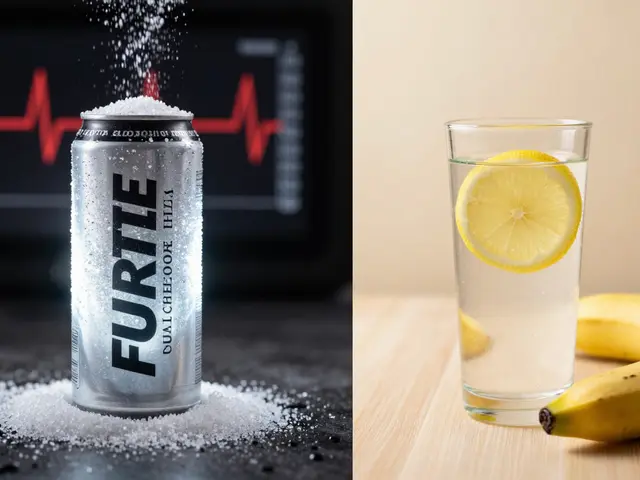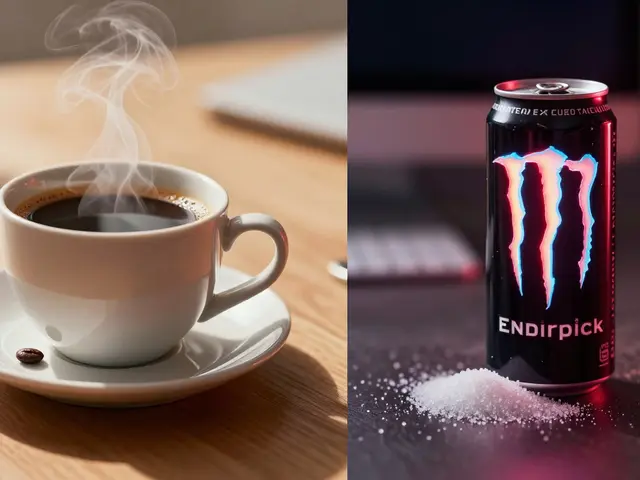Is C4 Energy Drink Healthy? What’s Really in It and Who Should Avoid It
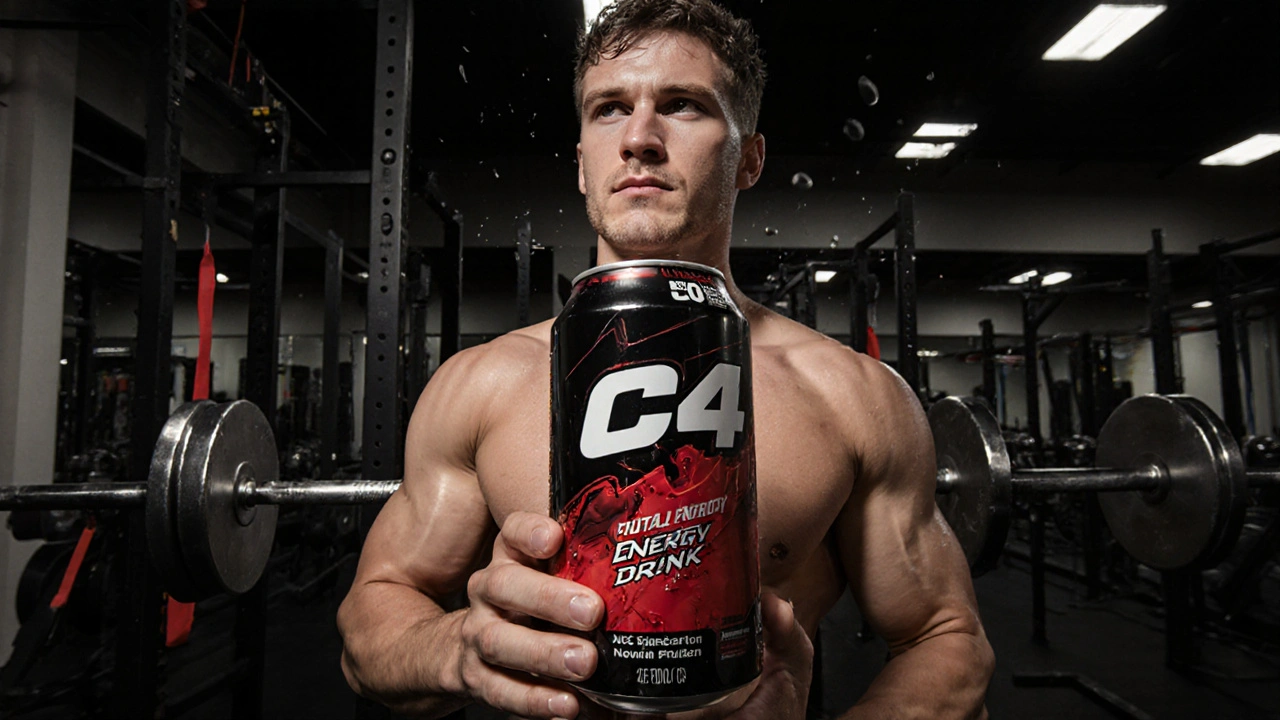
When you’re running on fumes before a workout, pulling an all-nighter, or just need a quick boost, C4 Energy Drink pops up everywhere-online, in gyms, at convenience stores. But here’s the real question: C4 energy drink is marketed as a performance booster, but is it actually healthy? The answer isn’t yes or no. It’s more like, ‘It depends on how much you drink, who you are, and what you’re comparing it to.’
What’s actually in C4 Energy Drink?
C4 comes in a few versions-Original, Smart Energy, and Sport-but most people mean the Original when they ask this question. A single 16-ounce can contains:
- 200 mg of caffeine
- 10 grams of sugar (in Original) or zero sugar (in Smart Energy)
- 1,500 mg of beta-alanine
- 1,500 mg of creatine nitrate
- 500 mg of arginine AKG
- Various B vitamins and artificial flavors
That’s a lot of active ingredients packed into one can. Most of them aren’t harmful on their own-but together, and with regular use, they can add up in ways you might not expect.
Caffeine: The big player
200 mg of caffeine is about the same as two cups of brewed coffee. The FDA says up to 400 mg per day is safe for most healthy adults. So one C4 won’t push you over the limit-if you’re not drinking more caffeine from coffee, tea, or soda.
But here’s the catch: caffeine affects people differently. If you’re sensitive to it, 200 mg can cause jitters, a racing heart, or trouble sleeping-even if you’ve had nothing else. People with anxiety, high blood pressure, or heart conditions should be cautious. And if you’re under 18, pregnant, or breastfeeding? The American Academy of Pediatrics and WHO both recommend avoiding high-caffeine energy drinks entirely.
Sugar vs. artificial sweeteners
The original C4 has 10 grams of sugar-that’s about 2.5 teaspoons. It’s not as bad as a soda (which often has 39 grams), but it’s still more sugar than most nutritionists recommend for a single drink. If you’re watching your sugar intake for weight, dental, or metabolic health, that adds up fast.
The Smart Energy version swaps sugar for sucralose and acesulfame potassium. These are FDA-approved artificial sweeteners, but they’re not harmless either. Some studies link them to changes in gut bacteria and increased sugar cravings over time. And while they don’t spike blood sugar, they’re still chemicals your body has to process.
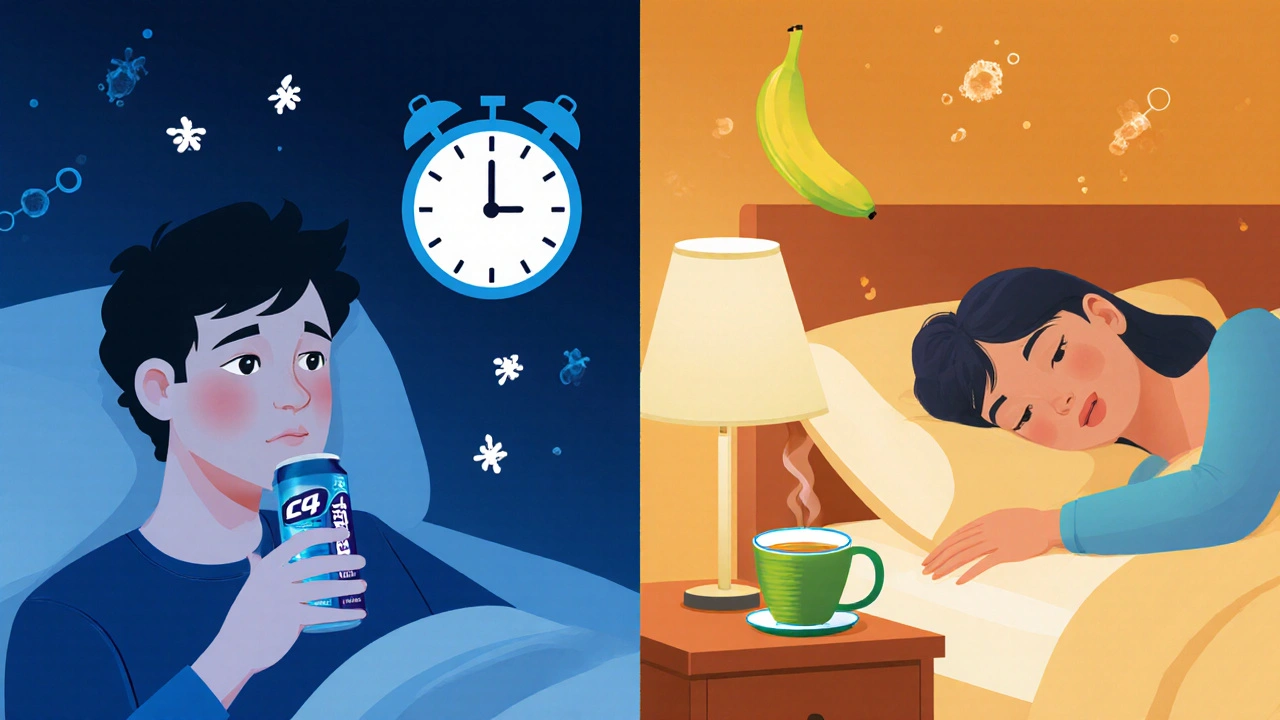
The ‘performance’ ingredients: beta-alanine, creatine, arginine
C4 touts these as ‘pre-workout’ boosters. Let’s break them down:
- Beta-alanine: This amino acid helps reduce muscle fatigue during short bursts of intense activity. 1,500 mg per can is a standard dose. It’s safe, but it causes a harmless tingling sensation (paresthesia) that some people find annoying.
- Creatine nitrate: Creatine is one of the most researched supplements in sports science. It helps with strength and power output. The nitrate form is less studied than creatine monohydrate, but it’s likely just a different delivery method. No red flags here.
- Arginine AKG: This is supposed to boost blood flow by increasing nitric oxide. But the dose in C4 (500 mg) is far below what studies show is effective (3-6 grams). So you’re not getting much benefit from it.
Bottom line: Two of the three ‘performance’ ingredients are legit. One is mostly filler. You’d get better results from a simple creatine monohydrate supplement and a pre-workout snack.
Who should avoid C4?
Not everyone should drink C4. Here’s who needs to skip it:
- Teens and kids: Their brains and hearts are still developing. High caffeine can disrupt sleep, increase anxiety, and affect heart rhythm.
- Pregnant or breastfeeding women: Caffeine crosses the placenta and enters breast milk. Even moderate intake may increase the risk of low birth weight or miscarriage.
- People with heart conditions: Caffeine can raise blood pressure and heart rate. If you have arrhythmia, hypertension, or a history of heart attack, skip it.
- Those on stimulant medications: ADHD meds like Adderall or Ritalin combined with caffeine can overstimulate your nervous system.
- People who drink multiple cans a day: That’s where the risks multiply-sleep loss, anxiety, digestive upset, and dependency.
Is C4 healthier than other energy drinks?
Compared to Red Bull or Monster? Yes, in some ways. C4 has less sugar than Monster (54 grams) and less caffeine than some high-octane brands like Bang (300 mg). But compared to natural energy boosters? Not so much.
Here’s a quick comparison:
| Drink | Caffeine | Sugar | Artificial Sweeteners | Added ‘Performance’ Ingredients |
|---|---|---|---|---|
| C4 Original | 200 mg | 10 g | No | Beta-alanine, creatine nitrate |
| C4 Smart Energy | 200 mg | 0 g | Sucralose, acesulfame K | Beta-alanine, creatine nitrate |
| Red Bull | 160 mg | 27 g | No | B vitamins, taurine |
| Monster Energy | 160 mg | 54 g | No | B vitamins, glucuronolactone |
| Black Coffee (black) | 150-200 mg | 0 g | No | None |
| Green Tea (brewed) | 30-50 mg | 0 g | No | L-theanine, antioxidants |
Black coffee or green tea give you caffeine without the additives. And they come with antioxidants, not synthetic chemicals. If you’re looking for a healthy energy boost, these are better long-term choices.
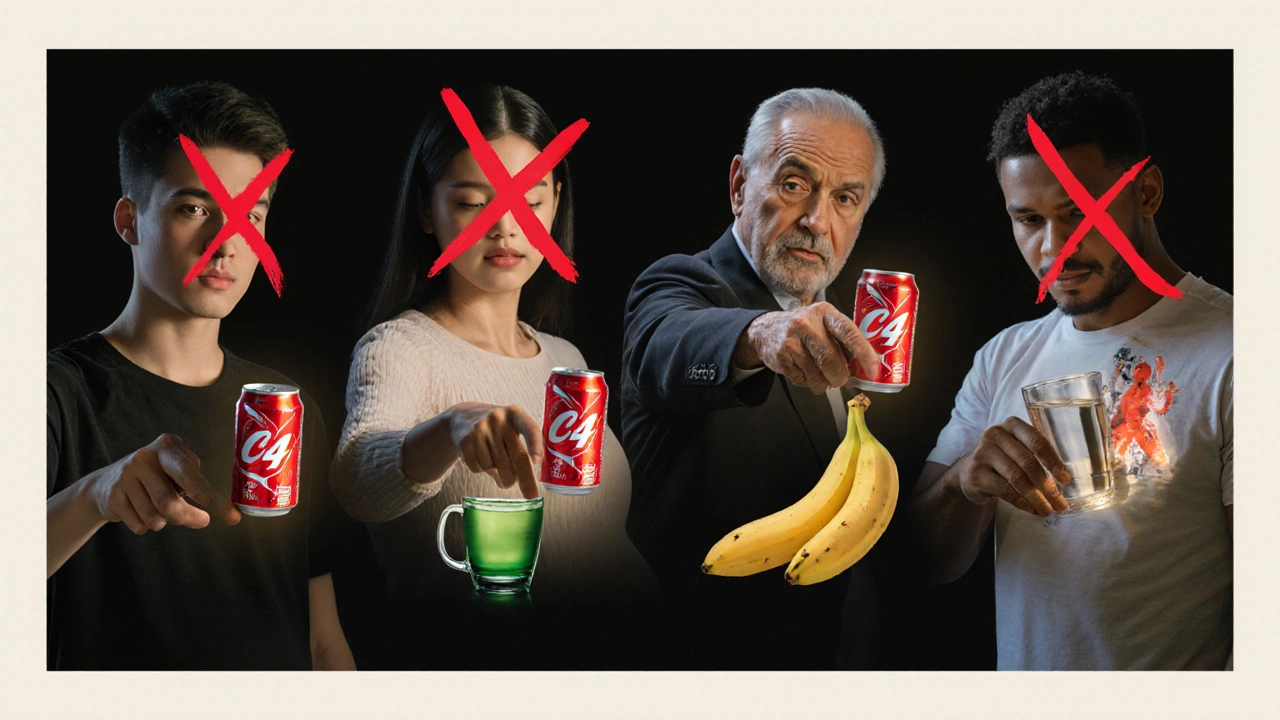
What happens if you drink C4 every day?
One can a day might be fine for a healthy adult. But daily use can lead to:
- Tolerance: You’ll need more caffeine to feel the same effect.
- Withdrawal: Headaches, fatigue, irritability if you skip a day.
- Sleep disruption: Even if you fall asleep, your deep sleep suffers.
- Digestive issues: Caffeine and artificial sweeteners can trigger bloating, cramps, or diarrhea.
- Dependency: You start believing you can’t work out, study, or function without it.
It’s not addiction in the clinical sense-but your brain gets used to the chemical push. And that’s not sustainable.
Healthy alternatives to C4
If you’re using C4 for energy, you’re probably trying to solve one of three things:
- You’re tired because you didn’t sleep well.
- You’re low on fuel before a workout.
- You’re mentally drained and need focus.
Here’s how to fix each without the drink:
- For sleep debt: Prioritize 7-8 hours. A 20-minute nap can be more effective than a can of C4.
- For workouts: Eat a banana with peanut butter 30 minutes before. Or sip black coffee. Both give you natural energy without chemicals.
- For focus: Try green tea. It has L-theanine, which smooths out caffeine’s edge and improves concentration without jitters.
Hydration matters too. Dehydration is one of the top causes of afternoon fatigue. Drink a glass of water before reaching for the energy drink.
Final verdict: Is C4 energy drink healthy?
C4 isn’t poison. But it’s not health food either. It’s a performance-enhancing beverage designed for short-term use-not daily consumption.
For healthy adults who drink it occasionally and don’t have underlying health issues, one can now and then is fine. But if you’re drinking it daily, relying on it to get through the day, or using it to replace sleep, food, or water-you’re using a bandage on a broken bone.
Real energy doesn’t come from a can. It comes from rest, nutrition, movement, and hydration. C4 might give you a quick spark-but it won’t light a long-lasting fire.
Can C4 energy drink cause heart problems?
Yes, especially with frequent use or in people with existing heart conditions. The high caffeine content can raise blood pressure and heart rate. In rare cases, it’s been linked to arrhythmias, especially when combined with other stimulants or physical exertion. If you feel your heart racing or pounding after drinking C4, stop using it and talk to a doctor.
Is C4 safe for teens?
No. The American Academy of Pediatrics advises against energy drinks for children and teens. Their developing brains and cardiovascular systems are more sensitive to caffeine and other stimulants. C4’s 200 mg of caffeine can interfere with sleep, increase anxiety, and disrupt normal brain development. Sports organizations also ban energy drinks for minors.
Does C4 help with weight loss?
No. While caffeine can slightly boost metabolism, C4 doesn’t contain ingredients proven to burn fat. The Smart Energy version has no sugar, but artificial sweeteners may increase cravings. Relying on C4 for weight loss is ineffective and can lead to overeating later. Real weight loss comes from diet, movement, and sleep-not energy drinks.
How long does C4 last?
The caffeine in C4 kicks in within 15-30 minutes and peaks around 1 hour. Most people feel the effects for 3-5 hours, but it can linger longer depending on metabolism. Beta-alanine’s tingling sensation fades in 30-60 minutes. Don’t drink it after 2 p.m. if you want to sleep well.
Can you drink C4 before working out?
Yes, if you’re healthy and don’t overdo it. The beta-alanine and creatine nitrate may help with endurance and strength during intense training. But you don’t need C4 for this. A banana and black coffee work just as well-and without the artificial ingredients. Drink it 20-30 minutes before your workout, and always hydrate with water afterward.

